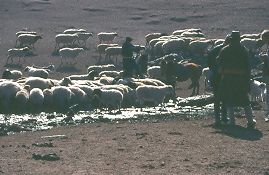Stichting DOEN contributed € 25,000 towards a poverty alleviation project in the Argalant village (some 30 km from HNP). This money was used to buy seeds and to set up a local bakery.
Thanks to the financial input by the Manders-Brada Stichting medico-technical equipment could be bought for the small medical clinics in each of the three villages around Hustai.
Via the United Nations Development Program (UNDP) the Dutch Ministry of International Cooperation financed the set up of a small-scale cheese producing cooperative factory in Altanbulag (50 km from HNP) and a yogurt producing plant in Bayanhangai (30 km from HNP). This to recompense the local herdsmen who no longer can use the area to pasture their flocks. They deliver milk to the cooperative of which they themselves are shareholder.
 The Dutch Ministry of International Cooperation financed the establishment of training centres for women in the three villages around Hustai. The project was executed by the Mongolian Women’s Federation to fight poverty. Jobless women with no income got the opportunity to acquire practical skills and insight in the workings of the market, which helped them to unfurl new activities and by so improve on their and their family’s living conditions. After having obtained a diploma the women could contract a loan against very low interest.
The Dutch Ministry of International Cooperation financed the establishment of training centres for women in the three villages around Hustai. The project was executed by the Mongolian Women’s Federation to fight poverty. Jobless women with no income got the opportunity to acquire practical skills and insight in the workings of the market, which helped them to unfurl new activities and by so improve on their and their family’s living conditions. After having obtained a diploma the women could contract a loan against very low interest.
The Dutch Ministry of International Cooperation also financed a medico-hygienic project for of the herdsmen families to improve basic healthcare (children’s vaccination, sick-calls, etc) and to provide accessible medical service. At Hustai National Park a medical post was installed. There was a simple ambulance to transport the very sick. In close collaboration with local physicians and nursing staff instructions on hygiene were given in the villages. Volunteers were trained to visit the herdsmen families. The small village hospitals received some money to repair the central heating system, to organize a small dispensary, basic repair work (broken floors and walls, etc) and for a better relief of patients. More details.
Veterinary service for the nomads was improved. In close collaboration with the veterinary inspectors of the three villages, a so-called ‘cattle-dip’ was built in the Tuul Valley. Here livestock undergoes anti-parasitic treatment. There is a better communal approach towards calamities.
In order to raise the quality of sheep and goats some pedigree animals were introduced. Lesser but higher quality livestock will help to prevent the vulnerable steppe of the buffer zone from getting overgrazed.
 Outside Hustai National Park two new watering places were constructed and ten existing ones repaired. Now the herdsmen no longer have to enter the protected Park to drench their animals.
Outside Hustai National Park two new watering places were constructed and ten existing ones repaired. Now the herdsmen no longer have to enter the protected Park to drench their animals.
Some smaller projects were also financed, like the reconstruction of the bridge across the Tuul River, repair of the heating system in the villages, patching up the village day care centres for herdsmen children, organizing a meeting place for the aged in Altanbulag, painting a school, etc.
